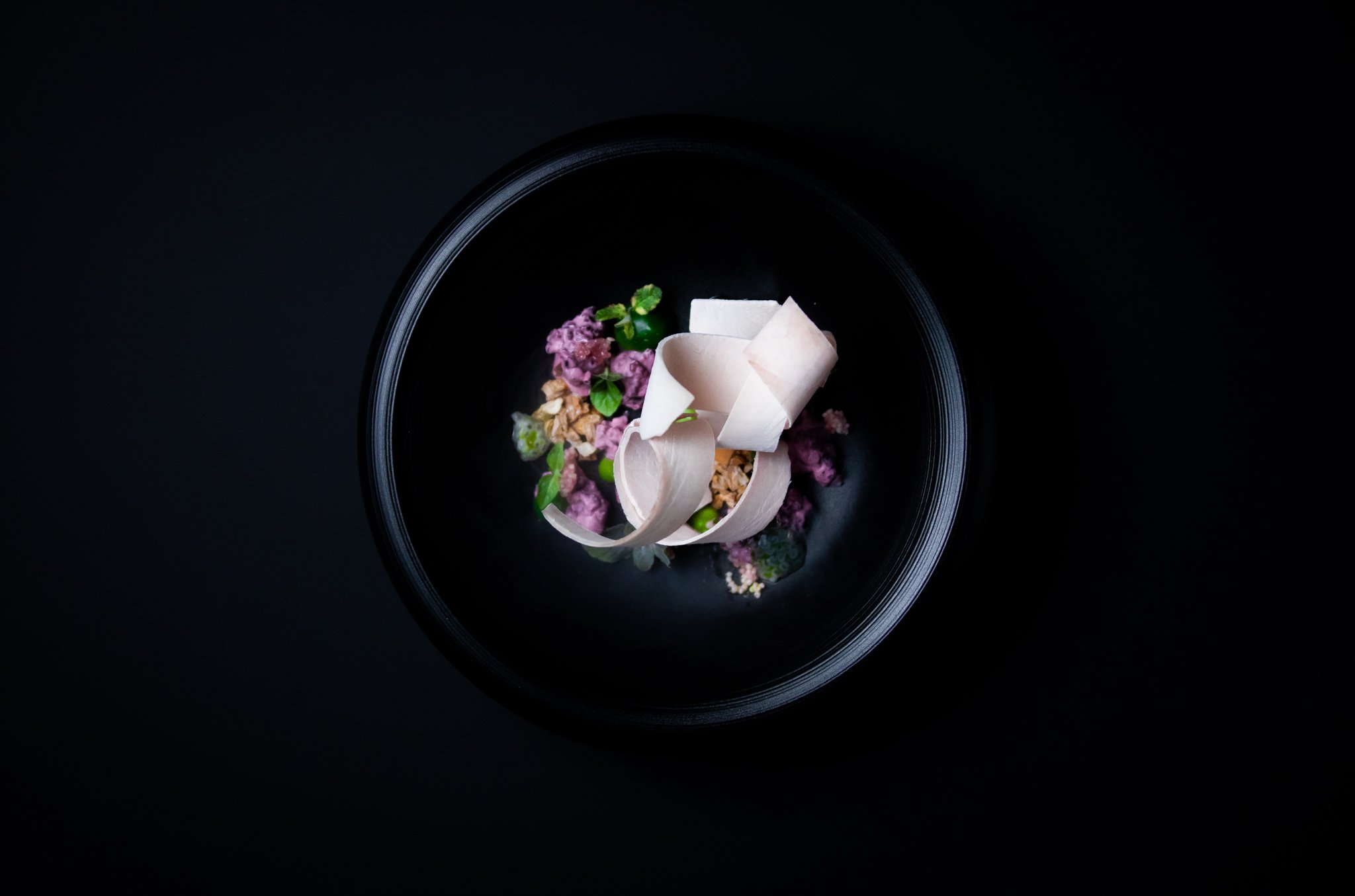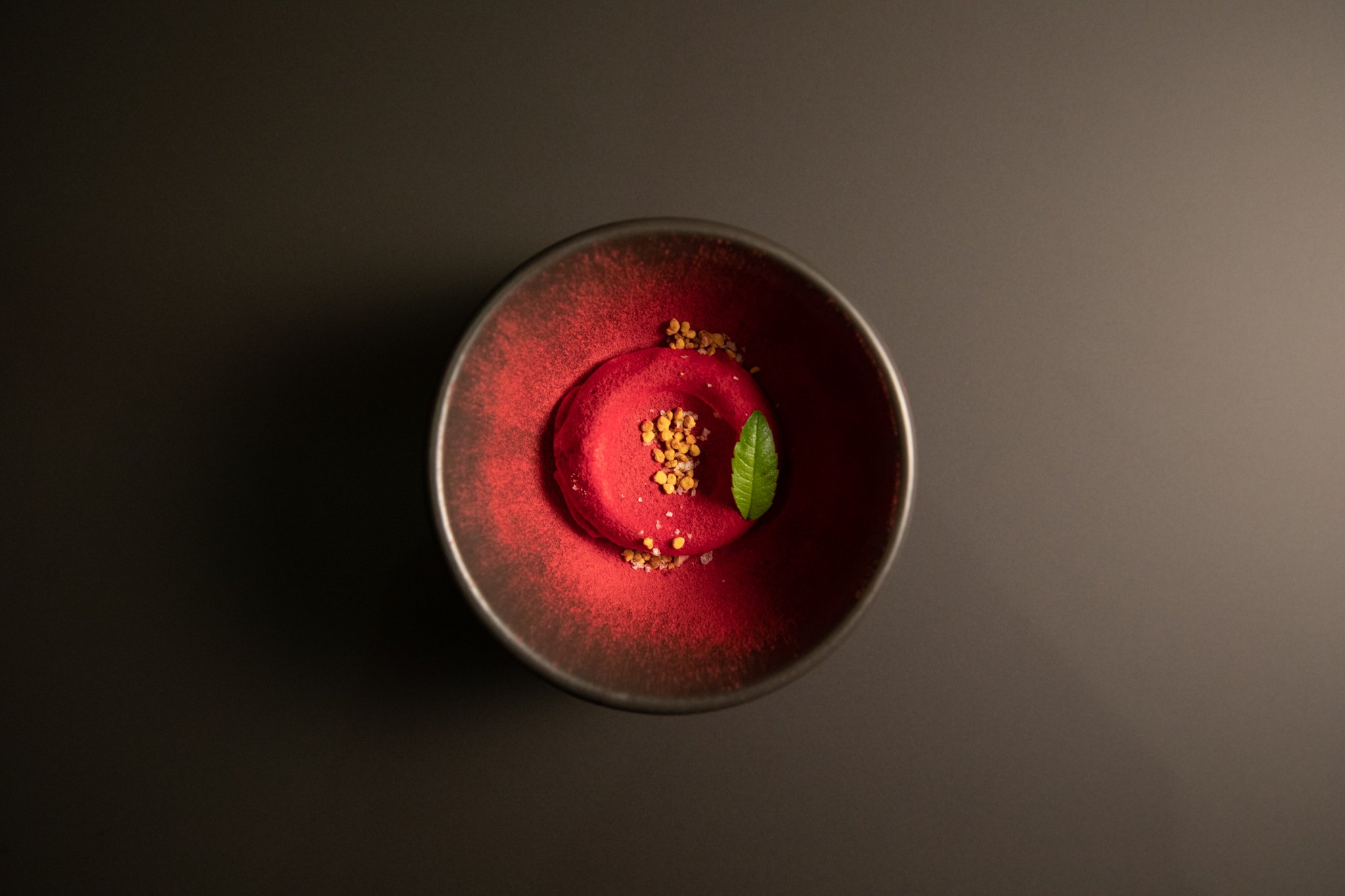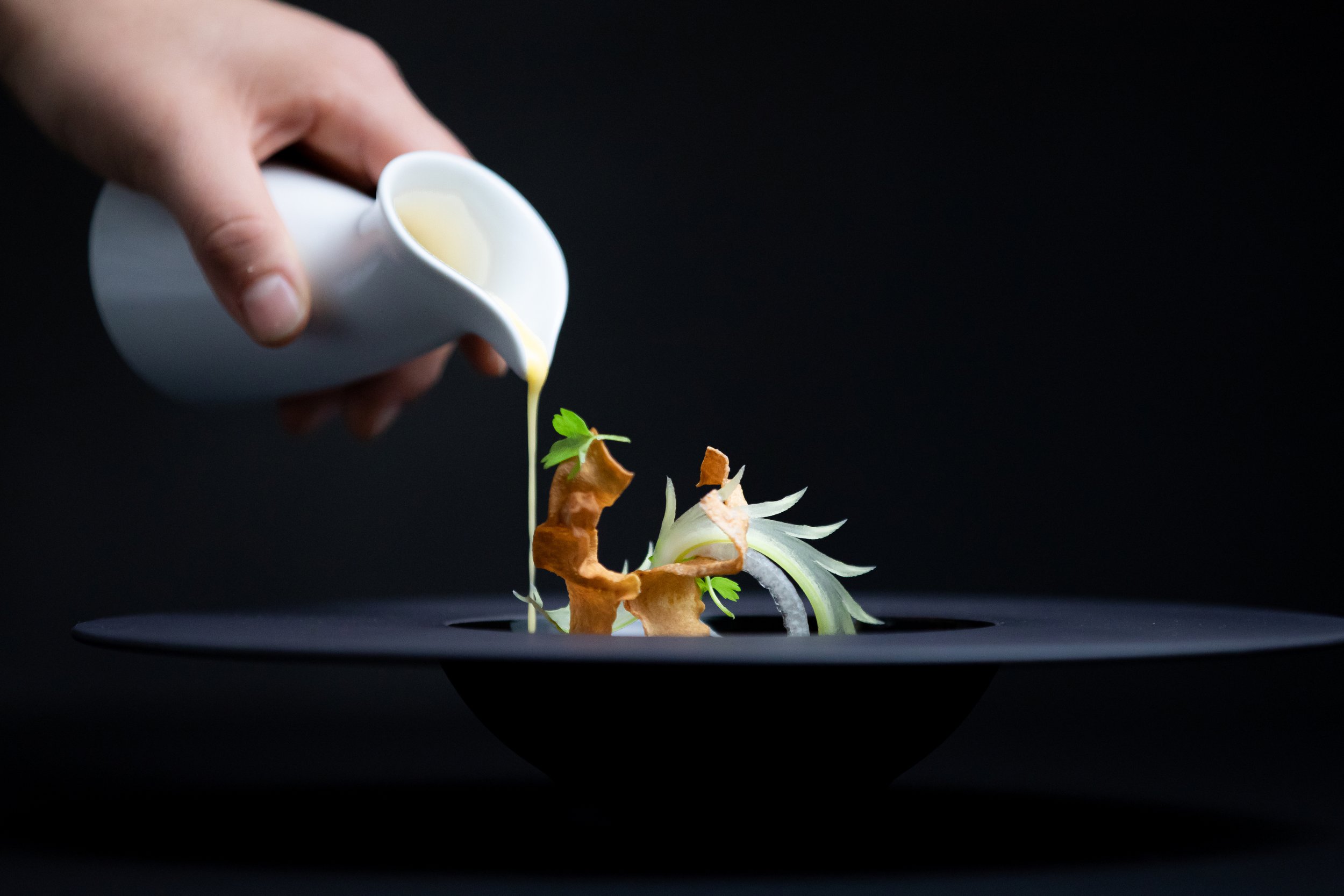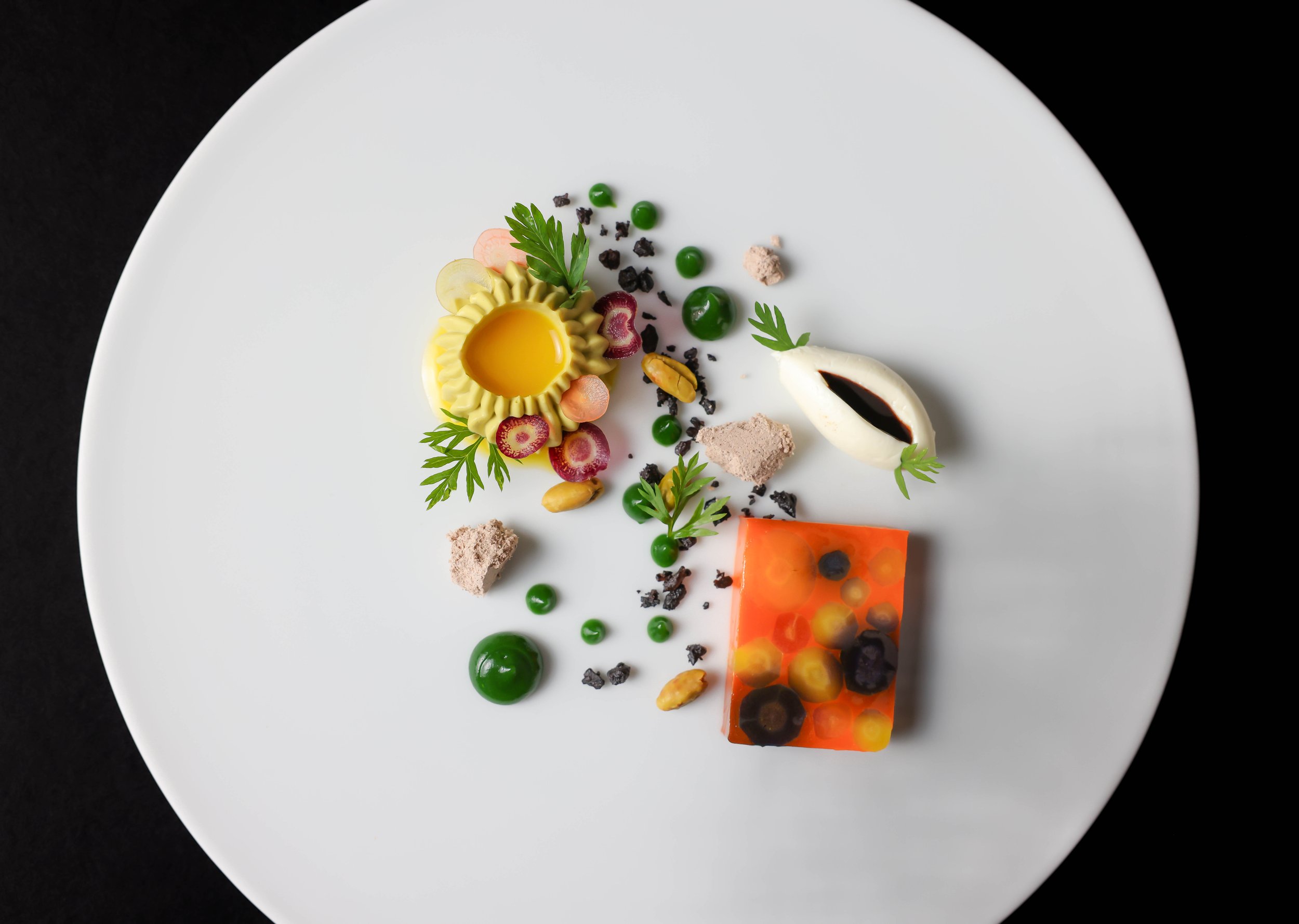Culinary: Curtis Duffy
By Alexandra Bradford
CURTIS DUFFY embarked on his culinary journey at the age of 14 when he discovered his passion in a small kitchen in his hometown of Johnston, Ohio. Reflecting on those early days, he recalls, "I was peeling potatoes and vegetables, and I started to make a game out of it. It was like, 'Alright, I can do 10 potatoes in three minutes; let's see if I can do it faster the next time.'"
After completing college, Duffy moved to Chicago where he honed his skills in renowned kitchens such as Charlie Trotter's, and Trio. In 2005 Duffy became the first chef de cuisine at Grant Achatz’s Alinea. The restaurant quickly became known as one of the best in America. Three years later, Duffy was ready to take the leap as head chef at Avenues, a restaurant in the Peninsula hotel on Michigan Avenue. His culinary prowess reached new heights at Avenues, where he earned two Michelin stars in 2010.
In 2011, Duffy, along with Avenues wine director and GM Micheal Muser, departed Avenues to establish the celebrated Chicago restaurant, Grace. Impressively, Grace garnered two Michelin stars in its inaugural year and maintained three Michelin stars for the following four consecutive years. However, in 2018, Duffy and Muser surprised the culinary world by stepping away from Grace due to a business dispute with owner Michael Olszewski. In our interview, Duffy emphasized the valuable lessons learned during this challenging period. He stressed the importance of aligning with business partners and acknowledged that success often involves overcoming challenges.
The subsequent years were dedicated to introspection and design, leading to the creation of Ever, a two-star Michelin restaurant in Chicago. Duffy's culinary ventures expanded further with After, a dinner and cocktail lounge, and Canvas, a luxury event space in Chicago's West Loop.
DEFINING GREATNESS spoke with Duffy to delve into the backstory of his success. The following conversation has been condensed and lightly edited for clarity.
DEFINING GREATNESS How did you determine when it was the right moment to embark on your own culinary venture?
CURTIS DUFFY I was very strategic in terms of who I wanted to work for and why I wanted to work for those chefs. I think if you want to be great at something, you have to surround yourself with greatness. I had amazing training in Columbus, Ohio, for the first six years of my professional career under John Sousa. That was a chef who was just so relentless with never saying no. I've taken that from him because I love that direction of leadership, where you empower the staff to think outside the box and be creative. As long as it's done with ultimate respect for the ingredient […] I'll always say yes; you'll never get no from me on that.
Strategically from there, I wanted to go and work for Charlie Trotter. Charlie was somebody that I just looked up to so much. And Grant ended up being a big inspiration in my career as well; he's such a creative force and such a talent. For me, I don’t think there was ever the right time to start my own business, if I had waited for that right time, I don’t think that time would have come. So you just gotta take that risk; you have to be risky and just go for it; that's the only way to truly know if you're going to be successful at something. You have to do it.
Being a chef is notoriously rigorous. When you were first starting out as a young chef, what did your day to day look like compared to what it looks like today?
It never felt like it was work to me; it was always about “what am I going to learn today? What can I do better? How can I be more efficient with what I was doing and trying to learn as much as I could.” But the workload was taxing. I would start anywhere from 10 in the morning, and then I’d get home sometimes three, four o'clock in the morning. Working at Charlie Trotter's was the hardest job I've ever had, including my own restaurants. It felt physically demanding, mentally demanding, and it was incredibly rewarding in every aspect of my career and personal life as well.
But today, my day starts at 10-11 o'clock in the morning at the restaurant. And lately, I've been trying to get out earlier, so I leave, 9:30-10 o'clock at night, where before it was two in the morning, three in the morning. And you know, that gets tiresome, and as you mature and get older, you start to figure out ways to use your time more wisely. And me being here at the restaurant till two in the morning, what are we gaining? I don't think we gain a lot from me just being here just to be here. I have to let a lot go, which is very hard for me to do. But you know, I have a great leadership team that we built over the years that takes full control over the restaurants when I'm not here. So I have to learn even to this day to let go even more and let them do their jobs. That's why we hired them.
Do you ever feel unmotivated or burnt out?
No, never. I'm so glad you asked that because I have so many cooks and so many front-of-house staff; we have over 60 employees. And I constantly hear that: I’m burnt out, I’m tired, I'm exhausted. Well, I have to say to you: you're probably running at 40% of your capacity and if you're exhausted and burnt out, you're probably in the wrong business. You're probably not that passionate about what you do, and I would encourage you to find something where you don't feel that way.
Everybody gets tired; everybody gets exhausted, including myself. I'm not some superhuman chef. But that idea of being burned out doesn't exist for me. I love what I do. I've dedicated my life to this career and this passion that I found at a young age.
Is it possible to have your level of success and have that work-life balance?
No, I don't think the balance will ever get there. I don't think that's ever possible. Not if you want to be great at something; I think you have to go above and beyond. In life, to be great at it, you have to. But those are my choices—I gotta get up and do something better than I did yesterday. And that's just my mindset.
What have you had to sacrifice in order to get to where you are?
A tremendous amount, the sacrifice of spending time with family and loved ones is something that is always going to be there. You sacrifice going to your children's events–sometimes your marriage, it's those moments where you think you wish you had the work-life balance because you've got to work, but you also have the kids who have things, they're growing up, they're getting older, they have more activities.
Right now, I'm struggling with that. My daughters are so big and busy now; they're both in high school, one's getting ready to graduate and go on to college. That's something I'm learning how to navigate through, and it's challenging. It's challenging because you want to spend more time with them. You miss them; they're only getting older, and you're missing those years.
Do you have regrets over those sort of sacrifices?
No, I try not to live with regrets. I tried to teach my kids that anything in life that you want, you have to work extremely hard for it, and you have to work harder than anyone else around you to get even a little bit further than them.
I hope that what I've done throughout my career has inspired them and has taught them enough so they can be successful [...] and do something great of their own.
We’ve talked in the past about our shared loss of a parent at a young age. The last time we talked, you shared with me a letter that your father left for you to find after he died in which he foresaw the success that you would have. Do you feel that his belief has played a role in shaping your determination to become this great chef?
I don't know if that has shaped my success. But I think my mother and father's work ethic has. I think of their relentless moments of working multiple jobs just to put food on the table and a roof over our heads. Seeing that as a young kid probably is what has inspired me to work as hard as I do. I'm not in a position where I have to work multiple jobs like they did, but I do work every single day. Even on the days off, I still seem to be doing something for my career to continue to move forward. Their work ethic has really pushed me.
What he wrote was incredibly kind. And maybe that's something he saw in me, but I would have loved to have had that shared with me when he was still alive and had that encouragement. As a younger kid, that would have been incredibly special. But you know, I'll take it in writing now. I'll take it. It's better than nothing.
I do look back at that. And I do read that every once in a while. I have it in my quotes, actually. I collect a lot of quotes that I enjoy reading. And that's always at the top of the list. It's something that is constant encouragement—keep pushing and keep pushing.
FX's The Bear shot scenes at your restaurant in its second season. Striking similarities between the main character, played by Jeremy Allen White, and yourself include both being chefs who found success early, experiencing the loss of a loved one nicknamed "Bear," and discovering letters from the "Bear" predicting their success after their passing. Did the show creators draw inspiration from your life for The Bear?
After filming here and having a good relationship with them, we talked about where the ideas come from. And it's from their childhood, telling the story of how they grew up. You're not the first person that said that the similarities are there and you can really pinpoint certain things in my life that are exactly what [The Bear] is. Whether that was woven in there, I don't know.
How realistic is The Bear in its depiction of kitchen life?
When they approached us to talk about filming in the restaurant for the second season, I hadn't watched the first season. As a chef, I thought, "What are you gonna do, go home and watch more cooking?" So, although I had heard the first season was really great, I didn't watch it. After they said, "Well, we want to film in the restaurant," I had to. I just had to watch it. I wanted to see what this was all about before I said yes.
The first season was incredible. I thought it was great. I felt very proud of Chicago. I think they really showed Chicago in a more approachable way than most TV shows filmed here in the city. It made me feel very proud of the city to be a part of it and to be living here for 24 years.
Overall, I think they do an incredible job to really give you a good sense of the character of what a chef's life could be. I think some of it is overplayed, but it's TV; it should be a little bit, but I think they do a better job than anybody else in terms of how it really is on a day-to-day basis and the struggles, the drinking, the drugs, and all that stuff. I think they do a really good job on it.
What did you think was overplayed in The Bear?
Not every restaurant is super loud and busy, just chaotic all the time. There are restaurants, like mine, that are very zen-like and very controlled. The way we run the kitchen is professional, nobody's screaming and shouting. I don't even yell at the staff. It's not what I do. I think if you're yelling, you have to analyze what got you to that point of yelling in terms of leadership. Something's wrong leading up to that point. Let's fix it so it doesn't happen again.
Why is it important for you to have a quiet and calm kitchen?
Noise is a distraction on any level. We built the kitchen in a way that the compressors are out of the kitchen because of the noise they generate. And then during service time, it's very important that nobody's really speaking; it's all about nonverbal communication, and command and response. When one person is talking, it's one voice. And the other side of that voice is the response to that command. If it's "pick-up two beef," it's just "Yes chef, two beef." That's it. Because all the chitter-chatter and all that stuff—it's a distraction, and we lose focus on the ultimate goal, which is the guest. And, you know, one mistake happens, and then it's a spiral effect. And one little mistake can really catastrophically change the way service is for the rest of the night.
Are there times where the kitchen can be energetically intense? And if so, how do you, as the leader, bring it back to where you need it to be?
A great leader would be able to see that from afar and hopefully guide that in a way so it doesn't happen. I think the greatest thing a leader can give to their staff is self-composure. It's one of the greatest things we can give to our cooks and waitstaff. When you're in the midst of challenges, if the leader is calm and collected instead of screaming and moving around, it gives everyone else the ability to stay calm, and then it becomes less frantic.
You push through with a clear head and direction of where it needs to go, leading the ship, steering it. You minimize a lot of mistakes happening.
Grace, your former restaurant, achieved three Michelin stars, while Ever currently holds two. In your view, how do the culinary experiences or quality at Ever compare to what was offered at Grace?
We're not there yet. And I love that idea because it keeps people hungry, with that fire and passion, including myself. We want to achieve that again. We built this restaurant to attain three Michelin stars, and we will get there. Something I've always said is, it's about time. Time is something we can't cheat; it allows us to hone our craft and our restaurant.
At Grace, it was a different time, different people. It's just different timing; that's all it is. We'll get there; we're not far off. I know we're not far off. I mean, we were open for three months, and we achieved two stars, we know three is achievable. I've been there; I know what it takes to get there.
We'll continue to push and be relentless in what we do; we have the grit, the tenacity to do it. It's not a race for us; we built this restaurant not just to achieve Michelin stars but ultimately to be a successful business. To build something for our future, an institution for many years to come. We built this for chefs to come, learn, train, and go on to be great at what they do. So that, at the end of the day, is the ultimate winning prize: watching our younger cooks, sommeliers, and staff members go off and do something of their own and be great at it.
In your opinion, what is the difference between a two star restaurant and a three star restaurant?
That's a great question, because I constantly struggle with that. Michelin loves to say it's just about the food, and they'll always say that, but I believe differently. I believe it's about the entire package; it really has to be. As an entire package, we are not there. In this last year, we had a tremendous amount of growth with opening two new spaces. That takes a lot away from me being in the kitchen every day. So this year, there's no growth going on, not that I foresee. I see things differently than anyone else in the restaurant. I see all the wrong things, the things that need to be fixed and tuned in.
Michelin says that when they come into a restaurant, the chef doesn't know that it's them. Is that true, or do you have a hunch when they are in the restaurant?
We don't know. That's an honest truth. But because we do our research on every single guest [...] to make their experience better, and if we can’t find anything about them, that’s a flag. So that table becomes flagged for that night, and we watch a little bit closer. It doesn’t really mean anything, but we do a little more homework at the table to try to figure out who they are. We use it to our advantage, for instance if we find out on Instagram that [a guest] is a Prince fan, and we also have a captain who is also a Prince fan, then we are going to put them together because it might come up in conversation and that might lead [the guest] to have a better experience.
I love that. You are basically utilizing investigative journalism to make guest experience better!
We have to, we've got to try to get every advantage we can with the guests because the expectations are so high. If we know Mr. Smith is left-handed, we're going to put all his silverware on the left-hand side so he doesn't have to switch it over. And we're going to do that right in the beginning so he doesn't think about it. I always say the greatest service is service that's unseen. It's the littlest things.
One of my investors loves Heineken, but we don't sell Heineken. But every time he's in the restaurant, we make sure we have Heineken. Not to offer to him, but just in case he wants a beer. It's those little moments that make it different.
What do you love to cook at home?
It's simple stuff, roasted chicken, vegetables and fish and very simple things for my kids because they all eat something different. I seem to be ordering out more than wanting to cook because I don’t have my kids all the time, but when I do have them, I usually cook.
When you order out or eat in a restaurant, how critical are you of the food?
I do find myself sometimes going “damn, I wish I had a lime for this”, but for the most part, I'm pretty simple. I try not to over examine or think about things too much when I'm not at work. It's more about being around the people that you're with and trying to enjoy the experience and not being super critical about it.




When you're creating a dish at Ever, how do you know when it’s ready to be on the menu?
It starts with the conceptualization on paper, and then it goes from that to exploring as many possibilities with that ingredient as possible. We don’t try to overcomplicate it, I would say a maxim of three to four flavors per dish but there is a lot going on. [For instance if we are using] fennel, we try to explore as many outlets of fennel as we can. Meaning we'll use the seed, the flower, the pollen, the stock, the fronds, the bulb, every stage of fennel that we could possibly use for a dish.
Then what other supporting elements are there that would support that fennel flavor? Then we reach for tangerine and black olives, and then how do we explore the olives? What kind of olives are they? You know, what citrus is it? Mandarin oranges, okay, can we use the skin? Can we use the leaves? How do we utilize everything about it? That's how this will start on paper.
And then it's about getting the ingredients in hand. And then usually, once they're in hand, they'll start taking a different shape, sometimes a lot different than what's sketched out on paper. The ingredients are where the real magic is. And then we eat a dish and we analyze it. We adjust, take things away, add things to it, depending on where we feel it needs to go until we get to a place where I'm satisfied with it. And then from that point, it's just about the constant refinement every day just trying to make it better and better and better.
How do you define greatness?
I think greatness comes from a lot of different avenues. The ability to watch someone take what they’ve learned and go on to do great things on their own. When I first hired Dan Bark, I thought “this kid is not going to work out.” And then somehow something clicked with him and he became one of the best employees that I ever had. That empowers what I think greatness is, being able to coach and mentor Dan Bark into who he is today. [Dan now has a Michelin star for his restaurant Cadence in Bangkok.]
I think there's greatness in everyone and it's a matter of finding out what it is, whether it is being the best guitar player or best artist or photographer or something else. Last night, I went to a Depeche Mode show and I looked at [their] stage from above and every piece of their musical piece was there for a reason. There were no wires, it was the cleanest stage I have ever seen. It reminded me of my kitchen. Even if I didn’t hear any music it would have still been perfect because of how the stage was set. I sat there last night and thought “how do I incorporate their stage that they take on the road [and its] perfectness into my kitchen?”
Last year, we had Trent Reznor [lead vocalist and principal songwriter of Nine inch Nails] and the band here and I said to my staff: “Trent, is a perfectionist, this guy is perfect and does not miss a beat,” and I added “It’s all about timing, timing, timing. Timing is going to be so important to him.” And [Trent] came back to the kitchen and that was something he mentioned to me, “the timing was impeccable. It was perfect and this meal was the highlight of my tour.”

